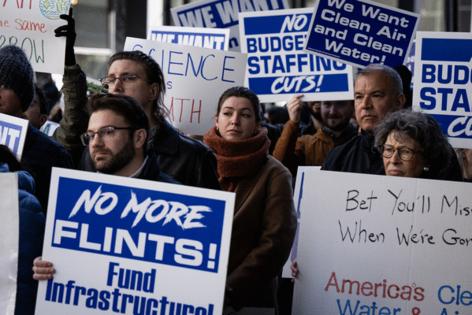Commentary: Go local to save the environment
Published in Op Eds
As the Trump administration dismantles federal environmental protections and strips the U.S. Environmental Protection Agency of its capacity to do its job, local governments are emerging as frontline defenders against dangerous and unchecked pollution.
On Chicago’s southeast side, where I live, our parks, schools and homes are surrounded by facilities that produce or handle dangerous toxic chemicals. Our only high school has an EPA monitor device that consistently registers some of the highest concentrations of toxic brain-damaging metals in the air.
That has made the local fight to reform broken zoning laws, which are at the root of many of the city’s environmental injustices, more urgent than ever.
Millions of people around the country are similarly engaged. Communities living next to industrial or distribution facilities are losing an important line of defense as enforcement dwindles, inspections decrease and polluters feel emboldened to cut corners at the expense of public health.
As we face unprecedented attacks from the Trump administration and a regulatory vacuum that leaves neighborhoods like mine dangerously vulnerable, local governments must step up to fill these gaps with policies that will protect us during times like these.
The segregation that has resulted from our city’s zoning laws is not just social, it’s also environmental. Industrial facilities are clustered in predominantly Black and Latino neighborhoods that create dangerous “sacrifice zones.” In these areas of the city, residents disproportionately suffer from asthma, cancer and chronic illnesses due to cumulative pollution exposure.
Neighborhoods like mine in Chicago tend to be vulnerable in many different ways — economically, socially and politically — and having polluting industries surrounding our homes, schools and parks only compounds those vulnerabilities. The added stress of poverty, limited health care access and systemic neglect make pollution an even greater threat.
Historically, zoning policies in Chicago and many other major U.S. cities have been deliberately or inadvertently shaped to place dangerous industry near marginalized communities, perpetuating environmental injustice for generations. The Trump administration’s systematic gutting of critical climate and environmental programs has made matters much worse. If we are going to protect the health of our communities, we need to act at the local level.
The cumulative impacts policies enacted in some states and cities, including California, Washington, Minnesota and New Jersey and programs in Seattle, Los Angeles and San Francisco, acknowledge that pollution does not exist in isolation. Rather, various negative impacts usually compound on top of each other, creating greater health risks than any single pollutant might individually. By taking into account the combined burdens, a cumulative impacts ordinance requires local governments to take into account the existing environmental threats on communities before permitting new major industrial operations or developments.
These laws empower residents, ensuring that developments truly reflect local needs and promoting sustainable growth that benefits everyone. Using a clearly defined process that involves community members from the start, cities can have developments that are cleaner and more sustainable.
This helps neighborhoods thrive economically — raising property values, attracting new investments and encouraging community revitalization. Public spaces become safer and healthier, promoting greater community engagement and cohesion. This fosters a cycle of positive reinforcement, where healthier communities attract better educational opportunities, employment and overall quality of life.
Historically marginalized communities, frequently excluded from development discussions, gain the ability to voice concerns and shape projects that directly impact their health and environment. This empowerment can lead to more direct engagement in our communities and more transparent governance processes, as residents become active participants in shaping their neighborhoods’ futures.
Implementing cumulative impacts ordinances is, of course, not without its challenges. Local governments must confront deeply rooted practices that prioritize industrial interests over community health. Proactively adopting comprehensive environmental policies not only avoids these costs but also positions cities as leaders in environmental innovation and social justice.
In this era of unstable federal protections, local governments must lead the way. By adopting cumulative impacts ordinances, cities like Chicago can demonstrate their commitment to protecting public health, ensuring environmental justice and fostering equitable and sustainable development for all communities.
____
Gina Ramirez is director of Midwest Environmental Health for the Natural Resources Defense Council. This column was produced for Progressive Perspectives, a project of The Progressive magazine, and distributed by Tribune News Service.
___
©2025 Tribune Content Agency, LLC.

























































Comments